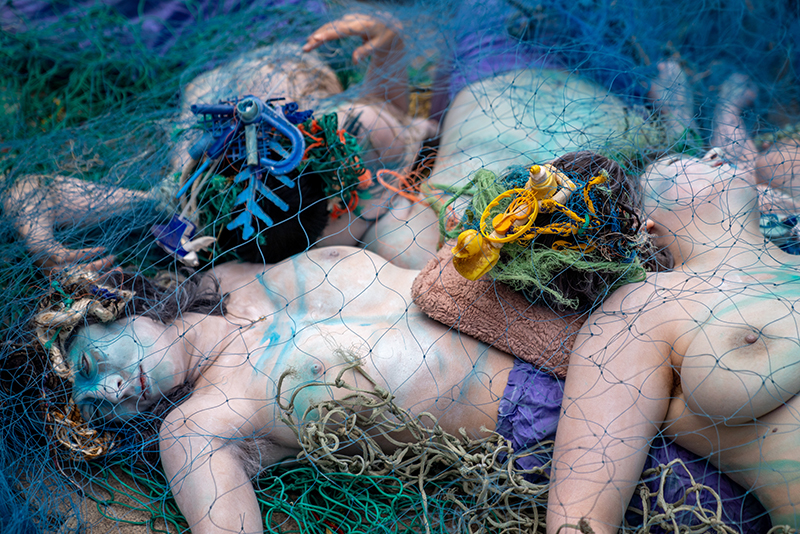ACT NOW TO SAVE CORAL REEFS
30.11.2022

By Chris Armstrong, Professor of Politics at the University of Southampton, and author of A Blue New Deal: Why We Need A New Politics for the Ocean
Coral reefs make up only 3 percent of the ocean, but are home to a quarter of all marine life. Only the rainforests can rival them for their incredible concentrations of biodiversity. Many fish use them as spawning grounds, where their young can grow to maturity away from large predators. Other species have adapted to live their whole lives on the reefs and nowhere else. For them, the end of the world’s coral reefs would be truly catastrophic. But the future for the world’s reefs is bleak, and the window of opportunity to save them is rapidly closing.
REEFS UNDER PRESSURE
Climate change represents a calamitous triple whammy for coral reefs: First and foremost, the warming of the ocean is destroying the fragile balance of life on the reefs. Coral depends on a delicate symbiosis between the corals themselves (which are made up of tiny animals), and the algae which give them their colour and help them tap energy from the sun. When placed under heat stress, corals expel this algae, losing their colour and an important energy source. This is what scientists call ‘coral bleaching.’ The coral is left a pale remnant of its former self, and will likely die unless it can restore the link with algae. Sadly, climate change is driving ever more frequent mass bleaching events, on the Great Barrier Reef and elsewhere. Second, climate change is feeding storms and extreme weather events, which can cause serious damage to coral. Third, the acidification of the ocean is undermining coral’s ability to regrow when it does suffer damage.
As if this were not bad enough, reefs are also being assailed by pollution and destructive fishing practices (including dredging, and the use of dynamite), as well as being smothered by sediment (a problem exacerbated by sea level rise). These great cathedrals of the ocean are literally crumbling before our eyes, along with the complex web of life they support.
Just how bad is the prognosis for the world’s reefs? According to scientists, by 2050 between 70 and 90 percent of coral reefs could be gone. The corals that survive are likely to be paler, harder, and less complex, and able to support less diverse ecosystems. In just thirty years, the world’s coral reefs will likely be a mere shadow of their former glory.

A REALITY CHECK
In light of such a bleak prognosis, it’s natural to clutch at any grounds for hope. This month we learned that a charity has arranged a $2 million insurance policy for Hawaii’s coral reefs, which means those reefs could be restored if they are damaged by storms. Many scientists are working to develop coral nurseries in cooler parts of the ocean, in the hope that coral could eventually be reintroduced to damaged reefs. This could involve seeding corals that are more resilient to climate change. A plan to identify the 50 most resilient species is now underway.
These plans are all worthwhile. But if the warming and acidification of the ocean continue, most coral will die. No amount of insurance can change that. Even ‘resilient’ corals will struggle to survive if we do not turn back the tide on our out-of-control emissions.
And plans to restore the reefs – however expensive – will not bring the reefs back to their former glory. If we keep pummelling the reefs with dynamite and dredging equipment, meanwhile, restoration projects will be pushing against a tide of ever-increasing destruction.
THE NEED FOR URGENT ACTION
Ultimately, if the reefs are to have a healthy future at the centre of the ocean’s ecosystems, we will have to rapidly scale up our responses to climate change. Rather than being lulled into a false sense of security by restoration good news stories, we need to focus on decarbonising our economies, starting right now. The 2020s will be crucial. In fact, even if we make excellent progress during this decade, the ocean’s corals are still likely to suffer. But every bit of progress we make now gives them more of a fighting chance. This means treating commitments by corporation and governments to meet the goal of Net Zero by 2050 with a healthy dose of scepticism, since these commitments often serve as cover for inaction. Instead, it means pushing all sectors of wealthy economies to make deep emissions cuts, in this decade, rather than the next.
We also need to recognise that a healthy and resilient ocean is incompatible with industrial fishing. The industrial fishing fleet is a major contributor to climate change in its own right, is damaging the ocean’s ability to absorb carbon, and its more destructive practices are wreaking direct damage on the coral reefs and other precious habitats.
This is why we need organisations like Ocean Rebellion, who are prepared to tell the truth about the fate of the ocean. Its ecosystems are dying. The institutions and laws that are meant to protect the ocean are not doing their job. Industrial fishing and complacent climate commitments need to be consigned to history. Our politicians have shown that they will not take the necessary action until enough citizens tell them that inaction is unacceptable. The time to act is now.
The fate of the Ocean depends on us all.
Our interventions depend on your support.

Photos, Merpeople and Torre de Bélem, João Daniel Pereira.